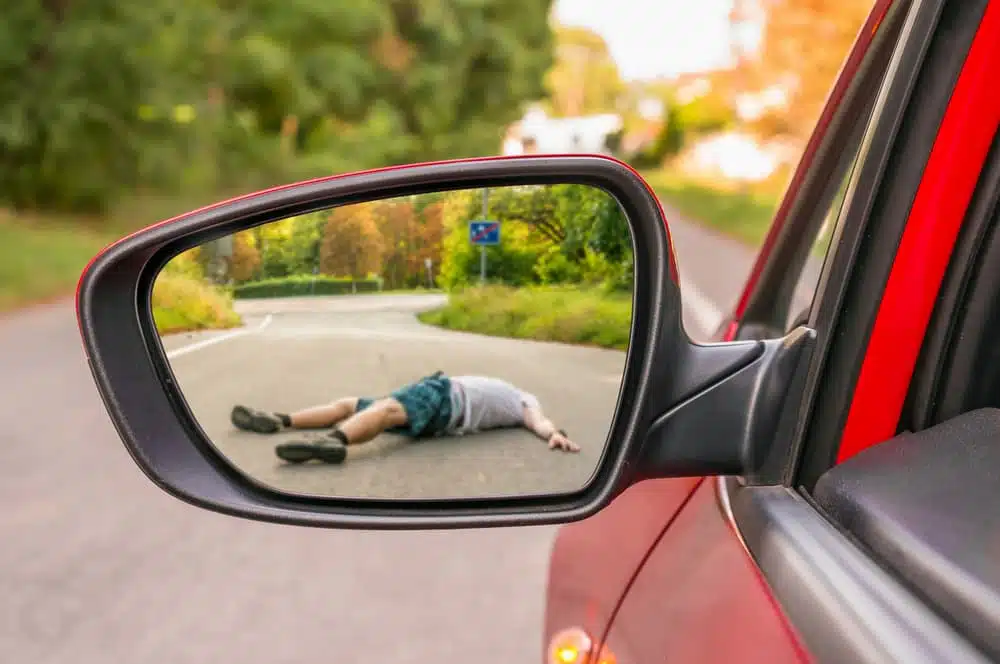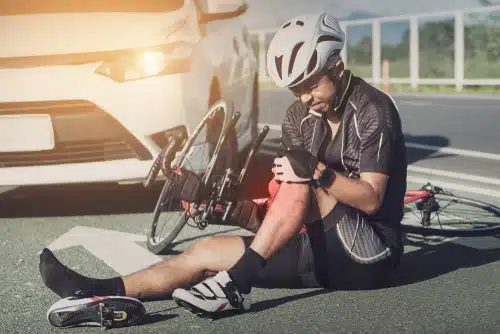
The shock and disbelief that follow a hit and run accident can leave you feeling vulnerable, confused, and overwhelmed.
In one moment, you’re going about your day, and in the next, you’re left standing on the side of the road, watching as the other driver speeds away without a second glance.
Your mind races with questions: “What just happened? Am I injured? What do I do now? How will I pay for the damages?”
After a hit and run accident, remain calm and take decisive action to ensure your safety and preserve your ability to seek compensation for your losses. The steps you take following the incident can significantly affect the outcome of your case. Consulting a car accident lawyer can help protect your rights and guide you through the process.
Steps to Take After a Hit and Run Accident
Following a hit and run accident, to ensure your safety and protect your rights:
Step 1: Ensure Your Safety
If your vehicle still runs, move it to a safe location away from traffic. If you can’t move your car, turn on your hazard lights and stay inside the vehicle with your seatbelt fastened until help arrives. If you must exit the vehicle, watch for oncoming traffic and move to a safe location, such as a sidewalk or shoulder of the road.
Step 2: Call the Police
Contacting law enforcement is crucial after a hit and run accident. When you call the police, provide them with as many details as possible about the incident. This includes the exact location of the accident, the time it occurred, and any information you can recall about the other vehicle, such as its make, model, color, and license plate number (even partial information can help).
If you notice any distinguishing features about the car, like bumper stickers or damage, share that information as well. The responding officer will create an official police report, which you need for your insurance claim and any legal proceedings that may follow.
Step 3: Document the Accident
Documenting the accident scene can build a strong case. If you can do so safely, take photos of the damage to your vehicle from various angles. If there’s debris on the road from the accident, photograph it. If you have any visible injuries, take pictures of them too.
Look for potential witnesses who may have seen the accident occur. Ask for their names and contact information, as their testimony could identify the hit and run driver or support your case.
Step 4: Seek Medical Attention
Your health should be a top priority after a hit and run accident. Even if you don’t feel like you’ve been seriously injured, it’s important to get checked out by a medical professional. Some injuries, like whiplash or concussions, may not present symptoms immediately.
Prompt medical attention ensures that you receive the necessary treatment and creates a record of your injuries, which you need for any insurance claims or legal proceedings. Keep track of all medical appointments, treatments, and expenses related to the accident.
Step 5: Contact Your Insurance Company
Notify your insurance company about the hit and run accident as soon as possible. Many insurance policies require timely reporting of accidents to maintain coverage. When you speak with your insurance provider, give them the details of the incident, including the police report number and any evidence you gathered.
If you have uninsured motorist coverage as part of your policy, this may cover the costs of damages and medical expenses if the hit and run driver is not identified or lacks sufficient insurance.
Step 6: Consult a Personal Injury Attorney
Insurance claims and legal proceedings make dealing with a hit and run accident complex and overwhelming. An experienced personal injury attorney can provide you with invaluable guidance and support.
One of the primary ways a lawyer can assist hit and run accident victims is by conducting a thorough investigation of the incident. This may involve gathering evidence from the scene of the accident, interviewing witnesses, reviewing police reports, and analyzing any available surveillance footage.
By building a strong case and identifying the responsible party, your attorney can pursue justice and hold the hit and run driver accountable for their actions.
Moreover, a car accident lawyer can help you navigate the complex insurance claims process and fight for the full compensation you deserve. This includes negotiating with insurance companies, ensuring that your rights are protected, and advocating for a settlement that covers all of your damages, including medical expenses, lost wages, pain and suffering, and property damage.
If the insurer refuses a fair settlement, your attorney can represent you in court and argue your case before a judge and jury, fighting tirelessly to secure the best possible outcome for your unique situation.
Why Do Hit and Run Accidents Happen?
Hit and run accidents are a serious problem on our roads, leaving victims feeling helpless and abandoned. Here are some of the common reasons behind hit and run accidents and the legal consequences for drivers who fail to take responsibility for their actions.
1. Fear of Legal Consequences
One of the most common reasons drivers flee the scene of an accident is the fear of legal consequences. They may worry about facing criminal charges, civil lawsuits, or losing their driver’s license.
This fear grows more powerful among drivers who:
- Are under the influence of alcohol or drugs
- Have a history of traffic violations or criminal convictions
- Are driving without a valid license or insurance
- Have outstanding warrants for their arrest
Leaving the scene of an accident is a crime in itself, and the legal consequences for a hit and run are often more severe than those for the original offense.
2. Panic and Poor Decision-Making
In some cases, drivers may flee the scene of an accident due to panic and poor decision-making. The shock of being involved in a collision can cause some people to react impulsively, leading them to make the rash decision to drive away without considering the consequences. This is particularly true for younger, less experienced drivers who may not fully grasp the severity of their actions.
3. Lack of Insurance or Driving an Unregistered Vehicle
Drivers who don’t have valid insurance or are operating an unregistered vehicle may be more likely to flee the scene of an accident to avoid the financial repercussions. They may fear that the costs of the damages and injuries caused by the accident will fall on them personally, leading to significant financial strain.
4. Involvement in Other Illegal Activities
In some cases, hit and run drivers may flee the scene because they are engaged in other illegal activities, such as transporting drugs or stolen goods. They may believe that staying at the scene of the accident will lead to the discovery of their other crimes, so they choose to run to avoid detection.
Legal Consequences of Hit and Run Accidents
Regardless of the reason, fleeing the scene of an accident is a serious crime with severe legal consequences.
Penalties for a hit and run can include:
- Hefty fines
- License suspension or revocation
- Jail time
- Restitution to the victims
- Increased insurance premiums
Moreover, hit and run drivers who are caught often face harsher penalties for fleeing the scene than they would have for the accident itself had they remained and taken responsibility for their actions.
Should I Accept the First Offer from the Insurance Company After a Hit and Run?
After a hit and run accident, dealing with insurance companies can be a daunting and confusing process. One common question that many accident victims have is whether they should accept the first settlement offer from the insurance company. Accepting the first offer without consulting with an experienced attorney is generally not a good idea.
Why You Shouldn’t Accept the First Offer
Insurance companies are businesses whose primary goal is to minimize payouts and maximize profits. An insurance adjuster’s initial settlement offer may not fully account for your damages.
Here are a few reasons why you may not want to accept the first offer:
- Inadequate Compensation: The first settlement offer may not cover all of your current and future medical expenses, lost wages, pain and suffering, and other damages related to the accident.
- Incomplete Understanding of Your Injuries: Some injuries, such as whiplash or traumatic brain injuries, may not immediately present symptoms or have long-lasting effects. Accepting an early settlement offer may prevent you from seeking additional compensation if your condition worsens over time.
- Waiving Your Rights: By accepting a settlement offer, you may be required to sign a release that waives your right to pursue further legal action against the insurance company or the at-fault driver, even if you discover additional damages later.
What You Should Do Instead
Instead of accepting the first settlement offer, to protect your rights and receive fair compensation:
- Consult a Personal Injury Attorney: An experienced personal injury attorney can evaluate your case, assess the full extent of your damages, and negotiate with the insurance company on your behalf. Most personal injury lawyers offer free consultations to help you understand your rights and options.
- Gather Evidence: Collect all relevant evidence related to your hit and run accident, including police reports, medical records, witness statements, and photographs of the damages and injuries. This evidence will be crucial in building a strong case and demonstrating the full extent of your losses.
- Calculate Your Damages: Work with your attorney to calculate the total value of your damages, including current and future medical expenses, lost wages, pain and suffering, and any other costs related to the accident. This will help you determine a fair settlement amount.
- Negotiate with the Insurance Company: Your attorney will negotiate with the insurance company on your behalf, presenting evidence of your damages and arguing for a fair settlement. If the insurance company refuses to offer a reasonable settlement, your attorney may advise you to file a lawsuit to pursue the compensation you deserve.
Contact a Hit and Run Lawyer You Can Trust
You don’t have to face the aftermath of a hit and run accident alone.
By taking the necessary steps to protect your safety, document the incident, and seek the help of experienced legal professionals, you can set the stage for a successful personal injury claim and work towards obtaining the compensation you deserve.
At Rothenberg Law Firm LLP, we understand the physical, emotional, and financial toll that a hit and run accident can take on victims and their families. That’s why we’re dedicated to providing our clients with the guidance, support, and legal experience they need to navigate this difficult time. Our experienced personal injury attorneys will work tirelessly to investigate your case, gather evidence, negotiate with insurance companies, and fight for your rights in court, if necessary.
If you or a loved one has been involved in a hit and run accident, don’t hesitate to contact Rothenberg Law Firm LLP for a free consultation. We’ll listen to your story, answer your questions, and provide you with the information you need to make informed decisions about your case.
Together, we’ll work towards holding the responsible parties accountable and securing the compensation you need to cover your medical expenses, lost wages, pain and suffering, and other damages.
Contact our car accident lawyers today at (800) 624-8888 or through our online form for your free consultation and to hear how we can help.





